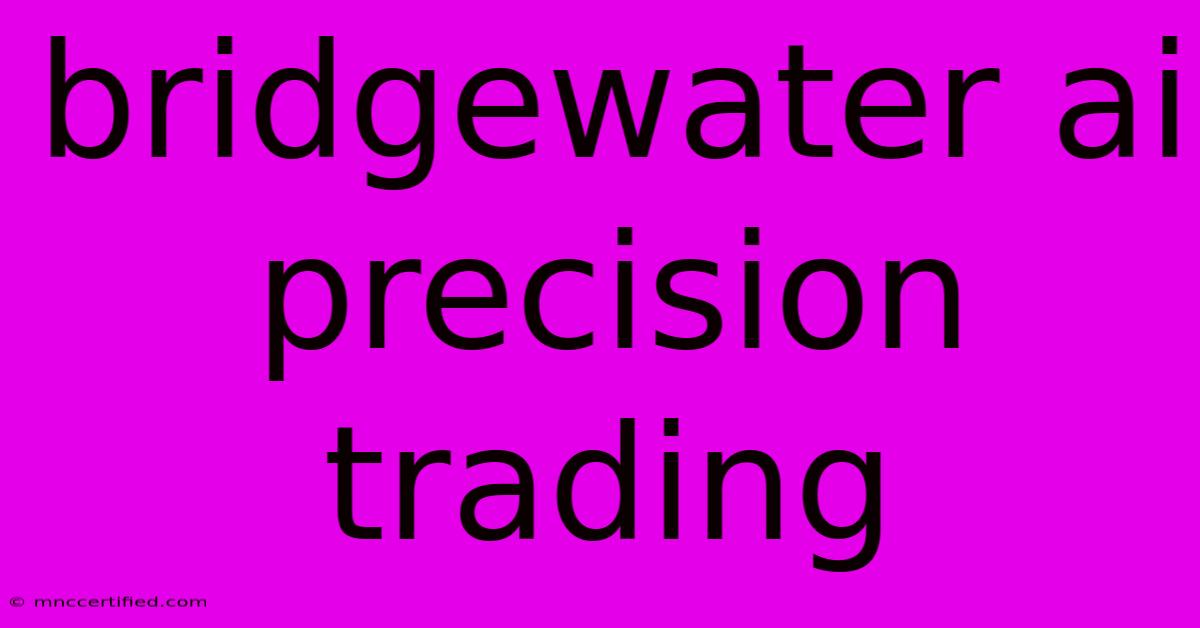Bridgewater Ai Precision Trading

Table of Contents
Bridgewater Associates' AI Precision Trading: A Deep Dive
Bridgewater Associates, the world's largest hedge fund, is renowned for its rigorous, data-driven approach to investing. A key component of their strategy is the increasingly prominent role of artificial intelligence (AI) in their precision trading efforts. This article delves into the intricacies of Bridgewater's AI-powered trading systems, exploring their methodologies, advantages, and potential limitations.
The Foundation: Data-Driven Investing at Bridgewater
Bridgewater's success hinges on its massive data collection and analysis capabilities. They gather information from a vast array of sources, including economic indicators, market trends, geopolitical events, and even social media sentiment. This data is then fed into sophisticated algorithms, many of which now incorporate advanced AI techniques. This data-driven investment approach, refined over decades, allows them to identify subtle patterns and predict market movements with greater accuracy than traditional methods.
Algorithmic Trading & AI Integration
Bridgewater doesn't rely solely on human intuition. Instead, they employ a complex system of algorithmic trading, where computer programs execute trades based on pre-defined rules and parameters. The integration of AI significantly enhances this system. AI algorithms, particularly machine learning (ML) models, can learn from vast datasets, adapt to changing market conditions, and identify complex relationships that might be missed by human analysts.
- Machine Learning for Pattern Recognition: ML algorithms excel at identifying intricate patterns in massive datasets – patterns that may be too complex for human analysts to discern. This enables more precise market predictions and optimized trade execution.
- Predictive Modeling & Risk Management: AI-powered predictive models help Bridgewater assess potential risks and returns more accurately, leading to improved portfolio diversification and risk management strategies. This allows for precision trading, where the timing and size of trades are optimized to maximize profits and minimize losses.
- Automated Trading & High-Frequency Trading (HFT): The integration of AI allows for faster and more efficient trade execution, including the use of high-frequency trading strategies. This speed advantage can be crucial in highly volatile markets.
Advantages of AI in Bridgewater's Precision Trading
The implementation of AI in Bridgewater's trading strategies offers several significant advantages:
- Increased Efficiency: AI automates many aspects of the trading process, freeing up human analysts to focus on higher-level strategic decisions.
- Improved Accuracy: AI algorithms can identify subtle patterns and relationships that humans might miss, leading to more accurate market predictions.
- Faster Execution: AI enables faster trade execution, providing a crucial advantage in dynamic market conditions.
- Reduced Emotional Bias: Unlike human traders, AI is not susceptible to emotional biases that can negatively impact investment decisions.
- Scalability: AI-powered systems can easily handle vast amounts of data and execute trades at a scale that would be impossible for human traders.
Challenges and Limitations
While Bridgewater's use of AI is groundbreaking, it's not without its challenges:
- Data Dependency: The effectiveness of AI algorithms relies heavily on the quality and completeness of the data. Inaccurate or incomplete data can lead to flawed predictions and poor investment decisions.
- Model Complexity: The complexity of AI models can make them difficult to understand and interpret, potentially hindering the ability to identify and correct errors.
- Unforeseen Events: AI models may struggle to predict unforeseen events like black swan events, which are inherently unpredictable.
- Ethical Considerations: The use of AI in high-stakes financial trading raises ethical concerns about transparency, accountability, and the potential for algorithmic bias.
Conclusion: The Future of AI in Precision Trading
Bridgewater's adoption of AI in its precision trading strategies represents a significant advancement in the field of quantitative finance. While challenges remain, the potential benefits of increased efficiency, accuracy, and speed are undeniable. As AI technology continues to evolve, we can expect to see even more sophisticated applications of AI in investment management, further blurring the line between human intuition and algorithmic decision-making. The future of precision trading likely lies in a synergistic partnership between human expertise and the power of artificial intelligence. Further research and development will be crucial in addressing the inherent challenges and ensuring responsible implementation of this transformative technology.

Thank you for visiting our website wich cover about Bridgewater Ai Precision Trading. We hope the information provided has been useful to you. Feel free to contact us if you have any questions or need further assistance. See you next time and dont miss to bookmark.
Featured Posts
-
Affordable Insurance Belle Glade
Nov 22, 2024
-
Cosmetic Dentistry Bonding Cost
Nov 22, 2024
-
President Elect Trumps Briefings Begin
Nov 22, 2024
-
Alaska Trading And Loan Soldotna
Nov 22, 2024
-
Smolletts Hate Crime Conviction Overturned
Nov 22, 2024